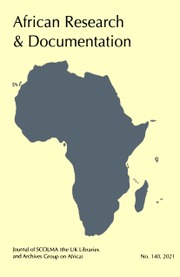No CrossRef data available.
Article contents
Written Conversations in a Global Nigeria: Nigeria and the Newsgroup
Published online by Cambridge University Press: 25 April 2022
Extract
This paper takes for its starting point research into a single Internet discussion group, soc.culture.nigeria. It aims to provide a broad overview of the group's characteristics for those readers unfamiliar with such groups, and to highlight some important issues surrounding this form of communication which could provide a basis for consideration of other online discussion groups in the context of African studies. In particular, as this essay originated with a conference on ‘African Readerships’, it addresses the changing nature of the reader/writer distinction, and the blurring of boundaries between such categories as ‘Nigerian’, ‘African’ and ‘international’. For instance, what is the relationship between these discussions, largely written in the US but read around the world, and Nigeria? How should we understand the term ‘Nigeria’, given the culturally and linguistically divided nature of the state, if not in terms of its geopolitical boundaries?
- Type
- Reading and Readership in West Africa
- Information
- Copyright
- Copyright © International African Institute 2000




